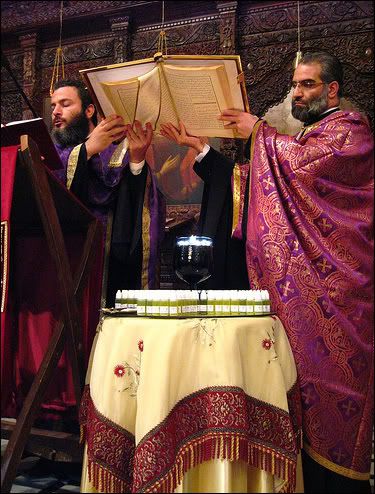
Two women were talking softly in church near the candle box. The younger one complained, "I am ill for a long time. I am visiting doctors, but almost of no avail. Now I decided to follow the advice of my acquaintances to receive extreme unction." Her interlocutor got frightened, "How can you, darling, you are married, aren’t you?" — "Yes, I am" — "So you cannot receive extreme unction, you will have to give up sleeping with your husband after it."
Indeed the Mystery of Holy Unction is the one most misunderstood and surrounded with many superstitions. Some elderly ladies who consider themselves experts of the Church canon rules would sometimes tell you incredible things! They say that one should not wash oneself after the extreme unction, that one should not eat meat, one should fast on Mondays; and moreover, that this Mystery can be received only by the dying. All that is not true.
The Mystery of extreme unction or anointing, as called in the sacred books, was introduced by the Lord, Jesus Christ. When reading Mathew’s Gospel we learn that the Apostles preaching in Palestine, anointed the sick with oil and healed them. The essence of this mystery is most completely disclosed by the Apostle James: "Is any one of you sick? He should call the elders of the church and pray over him and anoint him and with oil in the name of the Lord. And the prayer offered in faith will make the sick person well; the Lord will raise him up. If he has sinned, he will be forgiven" (James 5:14-15).
So, the extreme unction is the Mystery of healing. An Orthodox writer of the 19th century E. Poselyanin wrote: "It was not mentioned anywhere that a person should be terminally sick or helpless. We should remember that in Christianity the suffering of the soul is also considered to be an ailment... Thus, if I am suffering spiritually because some one in the family died, if I am sorrowful, if I need some good impulse to pull myself together and shake the shackles of despair from myself — I can resort to the extreme unction."
But in physical illnesses a person should also turn to God with prayer, not relying on the physician alone, as the latter is just a tool in the hands of God.
Usually the extreme unction is performed in the house at the bed of a sick person, but during the Great Lent extreme unction is exercised in churches too. In the course of the Mystery performed by several priests ("Sobor" — congregation), unction — plant oil — is blessed; 7 Apostles and Gospels are read, 7 prayers. After reading each of them Father anoints heads, chests, hands and feet of those receiving the extreme unction. The extreme unction is the image of God’s mercy, love and compassion (remember the parable of the good Samaritan).
Besides healing from diseases the extreme unction grants us forgiveness of the forgotten sins (but not those that were concealed on purpose). Due to weakness of our memory we can remember not all of our sins during confession, that is why it is understood without saying that anointing is of great value to us. Physically healthy people can resort to the mystery of extreme unction only if permitted by the priest.
OFFSITE: Beginning Orthodoxy, Part I - Original, full article.
OFFSITE: Amandia's Photography